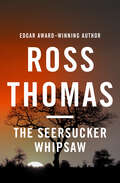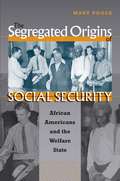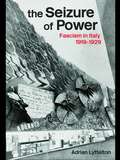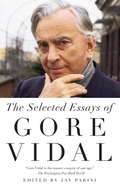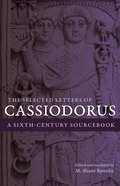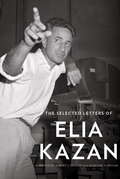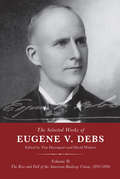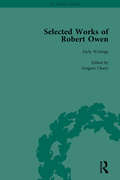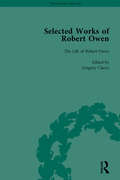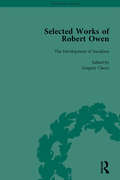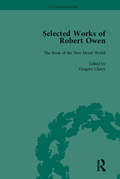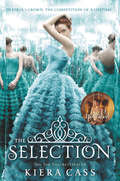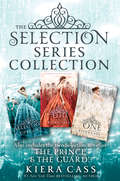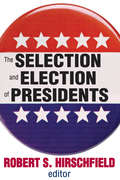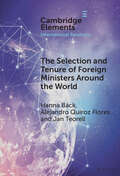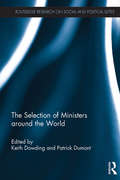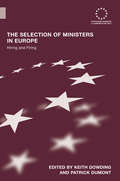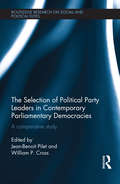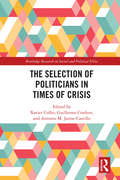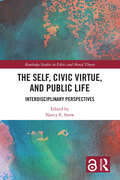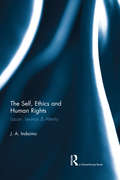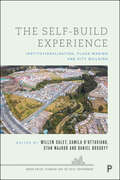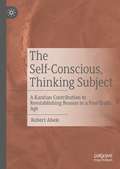- Table View
- List View
The Seersucker Whipsaw
by Ross ThomasFrom the Edgar Award–winning author: &“[A] highly readable novel of political adventure . . . a cracking good story and the Africa mentality is fascinating&” (Kirkus Reviews). Clinton Shartelle doesn&’t seem like a good choice to run a political campaign in Albertia. For one thing, he&’s American, and Albertia is a small coastal republic in Africa, about to be cut loose from the English Crown. For another, Shartelle is Southern and fiercely proud of it, and his ideas about racial politics veer unpredictably from progressive to rigidly old-fashioned. But Shartelle is the best, and the political future of Albertia is too important to be left to anyone else. If history is any indication, this first fair election will probably be the country&’s last. Rich natural resources make it attractive to businessmen on both sides of the Atlantic, opening Albertia up to political corruption. For his part, Shartelle is hired to make sure that a British industrialist&’s favored candidate wins the presidency. But the opposition is backed by the CIA, for whom murder is just another political tool.
The Seersucker Whipsaw: A Novel (Mysterious Press-highbridge Audio Classics Ser.)
by Ross ThomasFrom the Edgar Award–winning author: &“[A] highly readable novel of political adventure . . . a cracking good story and the Africa mentality is fascinating&” (Kirkus Reviews). Clinton Shartelle doesn&’t seem like a good choice to run a political campaign in Albertia. For one thing, he&’s American, and Albertia is a small coastal republic in Africa, about to be cut loose from the English Crown. For another, Shartelle is Southern and fiercely proud of it, and his ideas about racial politics veer unpredictably from progressive to rigidly old-fashioned. But Shartelle is the best, and the political future of Albertia is too important to be left to anyone else. If history is any indication, this first fair election will probably be the country&’s last. Rich natural resources make it attractive to businessmen on both sides of the Atlantic, opening Albertia up to political corruption. For his part, Shartelle is hired to make sure that a British industrialist&’s favored candidate wins the presidency. But the opposition is backed by the CIA, for whom murder is just another political tool.
The Segregated Origins of Social Security
by Mary PooleThe relationship between welfare and racial inequality has long been understood as a fight between liberal and conservative forces. In The Segregated Origins of Social Security, Mary Poole challenges that basic assumption. Meticulously reconstructing the behind-the-scenes politicking that gave birth to the 1935 Social Security Act, Poole demonstrates that segregation was built into the very foundation of the welfare state because white policy makers--both liberal and conservative--shared an interest in preserving white race privilege. Although northern white liberals were theoretically sympathetic to the plight of African Americans, Poole says, their primary aim was to save the American economy by salvaging the pride of America's "essential" white male industrial workers. The liberal framers of the Social Security Act elevated the status of Unemployment Insurance and Social Security--and the white workers they were designed to serve--by differentiating them from welfare programs, which served black workers.Revising the standard story of the racialized politics of Roosevelt's New Deal, Poole's arguments also reshape our understanding of the role of public policy in race relations in the twentieth century, laying bare the assumptions that must be challenged if we hope to put an end to racial inequality in the twenty-first.
The Seizure of Power: Fascism in Italy, 1919-1929 (Totalitarianism Movements and Political Religions)
by Professor Adrian Lyttelton Adrian LytteltonThis volume is a study of Fascism in its country of origin, Italy. It describes the impact of a new type of political movement on Italian government and society. The Fascist seizure of power did not begin or end with Mussolini's famous March on Rome in 1922; it was achieved rather by gradual subversion of the liberal order, which involved not only the destruction of all political opposition but also the creation of new institutions designed to control economic and cultural life. A classic work of wide-ranging scholarship, this book is here republished with a new preface by the author and will be essential reading for all students of Fascism and international history.
The Selected Essays of Gore Vidal
by Gore VidalGore Vidal—novelist, playwright, critic, screenwriter, memoirist, indefatigable political commentator, and controversialist—is America's premier man of letters. No other living writer brings more sparkling wit, vast learning, indelible personality, and provocative mirth to the job of writing an essay. This long-needed volume comprises some twenty-four of his forays into criticism, reviewing, political commentary, memoir, portraiture, and, occasionally, unfettered score settling. Among them are such classics as "The Top Ten Best-Sellers," “Dawn Powell: The American Writer,” “Theodore Roosevelt: An American Sissy," "Pornography," and "The Second American Revolution. ” Edited and introduced by Gore Vidal's literary executor, Jay Parini, it will stand as one of the most enjoyable and durable works from the hand and mind of this vastly accomplished and entertaining immortal of American literature.
The Selected Letters of Cassiodorus: A Sixth-Century Sourcebook
by CassiodorusOne of the great Christian scholars of antiquity and a high-ranking public official under Theoderic, King of the Ostrogoths, Cassiodorus compiled edicts, diplomatic letters, and legal documents while in office. The collection of his writings, the Variae, remains among the most important sources for the sixth century, the period during which late antiquity transitioned to the early middle ages. Translated and selected by scholar M. Shane Bjornlie, The Selected Letters gathers the most interesting evidence from the Veriae for understanding the political culture, legal structure, intellectual and religious worldviews, and social evolution during the twilight of the late-Roman state. Bjornlie’s invaluable introduction discusses Cassiodorus’s work in civil, legal, and financial administration, revealing his interactions with emperors, kings, bishops, military commanders, private citizens, and even criminals. Section notes introduce each letter to contextualize its themes and connection with other letters, opening a window to Cassiodorus’s world.
The Selected Letters of Elia Kazan
by Elia KazanThis collection of nearly three hundred letters gives us the life of Elia Kazan unfiltered, with all the passion, vitality, and raw honesty that made him such an important and formidable stage director (A Streetcar Named Desire, Death of a Salesman), film director (On the Waterfront, East of Eden), novelist, and memoirist. Elia Kazan's lifelong determination to be a "sincere, conscious, practicing artist" resounds in these letters--fully annotated throughout--in every phase of his career: his exciting apprenticeship with the new and astonishing Group Theatre, as stagehand, stage manager, and actor (Waiting for Lefty, Golden Boy) . . . his first tentative and then successful attempts at directing for the theater and movies (The Skin of Our Teeth, A Tree Grows in Brooklyn) . . . his cofounding in 1947 of the Actors Studio and his codirection of the nascent Repertory Theater of Lincoln Center . . . his innovative and celebrated work on Broadway (All My Sons, Cat on a Hot Tin Roof, J.B.) and in Hollywood (Gentleman's Agreement, Splendor in the Grass, A Face in the Crowd, Baby Doll) . . . his birth as a writer. Kazan directed virtually back-to-back the greatest American dramas of the era--by Arthur Miller and Tennessee Williams--and helped shape their future productions. Here we see how he collaborated with these and other writers: Clifford Odets, Thornton Wilder, John Steinbeck, and Budd Schulberg among them. The letters give us a unique grasp of his luminous insights on acting, directing, producing, as he writes to and about Marlon Brando, James Dean, Warren Beatty, Robert De Niro, Boris Aronson, and Sam Spiegel, among others. We see Kazan's heated dealings with studio moguls Darryl Zanuck and Jack Warner, his principled resistance to film censorship, and the upheavals of his testimony before the House Committee on Un-American Activities. These letters record as well the inner life of the artist and the man. We see his startling candor in writing to his first wife, his confidante and adviser, Molly Day Thacher--they did not mince words with each other. And we see a father's letters to and about his children. An extraordinary portrait of a complex, intense, monumentally talented man who engaged the political, moral, and artistic currents of the twentieth century. From the Hardcover edition.
The Selected Works of Eugene V. Debs, Volume II: The Rise and Fall of the American Railway Union, 1892–1896
by Eugene V. DebsThe second volume of essays and speeches from an early leader of the labor movement, who &“turned a radical creed into a deeply American one&” (The New Yorker). Tim Davenport and David Walters have extracted the essential core of Debs&’s life work, illustrating his intellectual journey from conservative editor of the magazine of a racially segregated railway brotherhood to his role as the public face and outstanding voice of social revolution in early twentieth-century America. Well over 1,000 Debs documents will be republished as part of this monumental project, the vast majority seeing print again for the first time since the date of their original publication.Eugene V. Debs (1855–1926) was a trade unionist, magazine editor, and public orator widely regarded as one of the most important figures in the history of American socialism. &“Tim Davenport and David Walters have given us, as they did with the first volume of the series, a real treasure, and a restoration.&” —Paul Buhle, for DSAUSA.org &“Gene Debs tirelessly urged the self-organization of working people in the United States as their only sure road to freedom. His role in the formation of the Socialist Party particularly provides lessons for our day.&” —Mark Lause, author of The Great Cowboy Strike
The Selected Works of Robert Owen Vol I (The\pickering Masters Ser.)
by Gregory ClaeysRobert Owen (1771-1858) was the founder of British socialism, and one of the most influential reformers in Britain and America in the first half of the 19th century. This book contains all Owen's key writings on the ideal community, socialism, religion, and the capitalist economic system.
The Selected Works of Robert Owen Vol IV
by Gregory ClaeysRobert Owen (1771-1858) was the founder of British socialism, and one of the most influential reformers in Britain and America in the first half of the 19th century. This book contains all Owen's key writings on the ideal community, socialism, religion, and the capitalist economic system.
The Selected Works of Robert Owen vol II
by Gregory ClaeysRobert Owen (1771-1858) was the founder of British socialism, and one of the most influential reformers in Britain and America in the first half of the 19th century. This book contains all Owen's key writings on the ideal community, socialism, religion, and the capitalist economic system.
The Selected Works of Robert Owen vol III
by Gregory ClaeysRobert Owen (1771-1858) was the founder of British socialism, and one of the most influential reformers in Britain and America in the first half of the 19th century. This book contains all Owen's key writings on the ideal community, socialism, religion, and the capitalist economic system.
The Selection (The Selection Series #1)
by Kiera Cass<P>For thirty-five girls, the Selection is the chance of a lifetime. The opportunity to escape the life laid out for them since birth. To be swept up in a world of glittering gowns and priceless jewels. To live in a palace and compete for the heart of gorgeous Prince Maxon. <P> But for America Singer, being Selected is a nightmare. It means turning her back on her secret love with Aspen, who is a caste below her. Leaving her home to enter a fierce competition for a crown she doesn't want. Living in a palace that is constantly threatened by violent rebel attacks. <P>Then America meets Prince Maxon. Gradually, she starts to question all the plans she's made for herself-and realizes that the life she's always dreamed of may not compare to a future she never imagined.
The Selection Series 4-Book Collection (Selection Series #1-4)
by Kiera CassThe first four books in Kiera Cass's #1 New York Times bestselling Selection series are now available in one ebook collection! <P><P>For thirty-five girls, the Selection is the chance of a lifetime. The opportunity to escape the life laid out for them since birth. To be swept up in a world of glittering gowns and priceless jewels. To live in a palace and compete for the heart of gorgeous Prince Maxon. <P>But for America Singer, being Selected is a nightmare. It means turning her back on her secret love with Aspen, who is a caste below her, and leaving her home to enter a fierce competition for a crown she doesn't want. <P>Then America meets Prince Maxon--and realizes that the life she's always dreamed of may not compare to a future she never imagined.And in The Heir, see how the story continues once America has found her happily ever after. <P>Includes: <br> The Selection <br> The Elite <br> The One <br> The Heir
The Selection Series Collection (Selection Series #1-5)
by Kiera CassThe three books of the #1 New York Times bestselling Selection series are available together for the first time, along with the first two novellas in the series. Perfect for gift givers and for fans new to the series, this is the only way to get all five stories in one bundle. <P> <P>The Selection: 35 girls. 1 crown. The competition of a lifetime. Kiera Cass's bestselling debut is a lush and romantic tale about one girl choosing between two loves--and two very different lives. <P>The Elite: 35 girls came to the palace. Only 6 remain. <P>In this sequel to The Selection, America Singer has grown closer to Prince Maxon and is among the top six contenders for his heart--but she isn't sure she's ready to be a princess. <P>The One: 35 girls entered the Selection. Only 1 can win. In this thrilling third novel, America must finally choose between Prince Maxon and her first love, Aspen--but her time to choose may have run out. <P>The Prince: This novella takes readers inside Prince Maxon's world before the Selection began, when there was another girl in his life.The Guard: This novella takes readers inside Aspen's world as a guard at the castle, where he is forced to watch his true love fall for someone else.
The Selection and Election of Presidents
by Daniel GasmanThe United States' presidential selection process is intricate, constantly evolving, and imperfectly understood by most American voters. The long campaign brings to light conflicting concepts of the role of the president, inherent constraints on his powers, contradictions in the selection process, and possibilities for change or compromise that are at once its strength and its weakness.The Selection and Election of Presidents is based on a series of meetings and seminars organized by a French-American organization concerned with the presidential selection/election process. A varied group of experts ranging from former presidential candidates, to party leaders to professors engaged each other in an informal setting with much give and take between the speakers and questions from participants. The result is a primer on how political parties operate, their relationship to other elements in the American political system, and how eff ectively parties operate in the light of changes or reforms.The exchanges resulting from the seminars that are the basis of this volume provide a still-valuable outline of how the American system works when presidents are selected.
The Selection and Tenure of Foreign Ministers Around the World (Elements in International Relations)
by Hanna Bäck Alejandro Quiroz Flores Jan TeorellForeign ministers are prominent actors in foreign affairs, often second only to heads of government in their influence. Yet, despite the growing awareness of the importance of key actors, and their backgrounds, in the study of international relations, foreign ministers remain understudied. In this Element, we make an important empirical contribution by presenting an original dataset on the personal and professional background of foreign ministers, spanning thirteen countries and more than 200 years. We use these data to answer three questions: who are the foreign ministers, why are foreign ministers with particular features appointed, and why do some foreign ministers have longer tenure than others? We find that foreign ministers tend to be men of politics who are appointed both on the basis of their affinity to, and to complement the experiences of, the head of government. We also find that foreign ministers stay longer in office when they perform well or are expected to do so, but that they are more likely to lose their posts when conditions make heads of government more prone to 'pin blame' on them to deflect criticism from foreign policy failures.
The Selection of Ministers around the World: A Comparative Study (Routledge Research on Social and Political Elites)
by Keith Dowding Patrick DumontGoverning cabinets are composed of ministers who come and go even as governments march on. They work for the chief executive, the prime minister or the president, for their parties and for the constituent groups from which they come. They are chosen for their role and dismissed from it for all sorts of reasons that vary across time and country. This book examines the process of selection, shuffling and removal of ministers in national cabinets around the world. Drawing on original data over several decades, it offers a series of case studies of countries from around the world with differing institutional and cultural structures including presidential and semi-presidential systems, and parliamentary, unitary and federal systems, some of which have experienced periods under authoritarian regimes. Featuring 14 case studies on North and South America, Asia, Africa, Australia and New Zealand, this book complements the earlier volume The Selection of Ministers in Europe (Routledge, 2009). This volume will be an important reference for students and scholars of political science, government, executives, comparative politics and political parties.
The Selection of Ministers in Europe: Hiring and Firing (Routledge Advances in European Politics)
by Keith Dowding Patrick DumontThis volume discusses the formation of government cabinets within twenty European democracies, providing the institutional background to the selection and de-selection of ministers. Exploring the historical and constitutional context to cabinet formation, this volume proceeds to provide vital data on the strategic issues that affect the selection of ministers. Covering states from all over Europe, the authors examine trends from the post-war period up to the present day, with specific focus on recent decades for the newer democracies in political transition. The volume includes: pioneering new research into the hiring and firing of government ministers vital information on appointments, dismissals and resignations within government cabinets succinct constitutional data relating to ministerial selections across a number of European states The book is the first output of the Selection and De-selection of Political Elites international network of scholars (SEDEPE) and will provide a major source of information for all scholars interested in the formation, maintenance and termination of cabinets and the nature of ministerial government. The Selection of Ministers in Europe. Hiring and Firing will also be of broader interest to students of European Government and Political Institutions.
The Selection of Political Party Leaders in Contemporary Parliamentary Democracies: A Comparative Study (Routledge Research on Social and Political Elites)
by William P. Cross Jean-Benoit PiletThis book explores the ways in which political parties, in contemporary parliamentary democracies, choose their leaders and then subsequently hold them accountable. The authors provide a comprehensive examination of party leadership selection and accountability both through examination of parties and countries in different institutional settings and through a holistic analysis of the role of party leaders and the methods through which they assume, and exit, the office. The collection includes essays on Australia, Austria, Belgium, Canada, Germany, Hungary, Israel, Italy, Portugal, Romania, Spain, Norway and the United Kingdom which have important differences in their party systems, their degree of democratization, the role assigned to party leaders and their methods of leadership selection. Each country examination provides significant data relating to party rules and norms of leadership selection, leadership tenures and leadership contests. The book concludes with a chapter that merges the country data analyses to provide a truly comparative examination of the theoretical questions underlying the volume. This book will be of strong interest to students and scholars of legislative studies, elections, democracy, political parties, party systems, political elites and comparative politics.
The Selection of Politicians in Times of Crisis (Routledge Research on Social and Political Elites)
by Xavier Coller Antonio M. Jaime-Castillo Guillermo CorderoSelecting candidates for elections is a major goal of political parties and a major function of political regimes in democratic systems. With the negative effects of the economic crisis being seen to translate into changes in voting patterns, and citizens using elections to punish parties in government for their roles in economic mismanagement or lack of response to the global economic crisis, a broad examination is required. This book is presented as the first comparative study of the effects of the political crisis on candidate selection covering a large number of countries. Using an integrated framework and unified strategy, it examines how new relevant political actors are really implementing participative ways of candidate selection, whether they are being innovative in their political environments and the extent to which traditionally mainstream parties are changing selection procedures to have more open and inclusive mechanisms as part of internal, or intra-party, democracy. The book illuminates these issues through empirically driven chapters explaining changes in the way candidates for parliaments are selected in countries where new parties have emerged and consolidated, or where traditional mainstream parties have adopted new mechanisms of selection affecting (if not challenging) traditional politics. Additionally, therefore, this work will serve as a response to some current debates in the discipline on the consequences of the democratization of party life, relating political participation and representation. This text will be of key interest to scholars and students of political parties, organizational change, social and political elites and more broadly to comparative politics and sociology.
The Self, Civic Virtue, and Public Life: Interdisciplinary Perspectives (Routledge Studies in Ethics and Moral Theory)
by Nancy E. SnowThis volume showcases new and interesting ways in which the possession of civic virtues can contribute to people’s abilities to engage in public life in meaningful ways.What is the role of civic virtues in public life? How does possessing civic virtues affect persons and their capacities for participation in the public order? The chapters in this volume combine philosophical and empirically informed work to show how civic virtues can be informed by larger virtue ethical perspectives. The first two chapters discuss virtues of individuals that have not received significant empirical attention—authenticity and wisdom and psychological resilience. The next two chapters address education and the ways in which civic virtues can help us to better serve schoolchildren who are socially and economically disadvantaged, as well as to broaden students’ horizons with respect to character and sustainability education. The final four chapters explore the roles for virtues within various political and public realms. They offer perspectives on how virtues affect contentious politics in democratic societies, and study virtues in contexts in which democracy has been stifled or torn apart by war. Together, the chapters highlight the ever-widening impact of the virtues on our lives and in society.The Self, Civic Virtue, and Public Life will be of interest to scholars and graduate students working in ethics, political philosophy, psychology, and philosophy of education.The Open Access version of this book, available at www.taylorfrancis.com, has been made available under a Creative Commons Attribution-Non Commercial-No Derivatives (CC-BY-NC-ND) 4.0 International license.
The Self, Ethics & Human Rights
by Joseph IndaimoThis book explores how the notion of human identity informs the ethical goal of justice in human rights. Within the modern discourse of human rights, the issue of identity has been largely neglected. However, within this discourse lies a conceptualisation of identity that was derived from a particular liberal philosophy about the ‘true nature’ of the isolated, self-determining and rational individual. Rights are thus conceived as something that are owned by each independent self, and that guarantee the exercise of its autonomy. Critically engaging this subject of rights, this book considers how recent shifts in the concept of identity and, more specifically, the critical humanist notion of ‘the other’, provides a basis for re-imagining the foundation of contemporary human rights. Drawing on the work of Jacques Lacan and Emmanuel Levinas, an inter-subjectivity between self and other ‘always already’ marks human identity with an ethical openness. And, this book argues, it is in the shift away from the human self as a ‘sovereign individual’ that human rights have come to reflect a self-identity that is grounded in the potential of an irreducible concern for the other.
The Self-Build Experience: Institutionalization, Place-Making and City Building (Urban Policy, Planning and the Built Environment)
by Willem Salet, Camila D’Ottaviano, Stan Majoor and Daniël BossuytUsing a broad international comparative perspective spanning multiple countries across South America, Europe and Africa, contributors explore resident-led self-building for low and middle income groups in urban areas. Although social, economic and urban prosperity differs across these contexts, there exists a recurring, cross-continental, tension between formal governance and self-regulation. Contributors examine the multi-faceted regulation dilemmas of self-building under the conditions of modernization and consider alternative methods of institutionalization, place-making and urban design, reconceptualizing the moral and managerial ownership of the city. Innovative in scope, this book provides an array of globalized solutions for navigating regulatory tensions in order to optimize sustainable development for the future
The Self-Conscious, Thinking Subject: A Kantian Contribution to Reestablishing Reason in a Post-Truth Age
by Robert AbeleThis book argues that the primary function of human thinking in language is to make judgments, which are logical-normative connections of concepts. Robert Abele points out that this presupposes cognitive conditions that cannot be accounted for by empirical-linguistic analyses of language content or social conditions alone. Judgments rather assume both reason and a unified subject, and this requires recognition of a Kantian-type of transcendental dimension to them. Judgments are related to perception in that both are syntheses, defined as the unity of representations according to a rule/form. Perceptual syntheses are simultaneously pre-linguistic and proto-rational, and the understanding (Kant’s Verstand) makes these syntheses conceptually and thus self-consciously explicit. Abele concludes with a transcendental critique of postmodernism and what its deflationary view of ontological categories—such as the unified and reasoning subject—has done to political thinking. He presents an alternative that calls for a return to normativity and a recognition of reason, objectivity, and the universality of principles.
